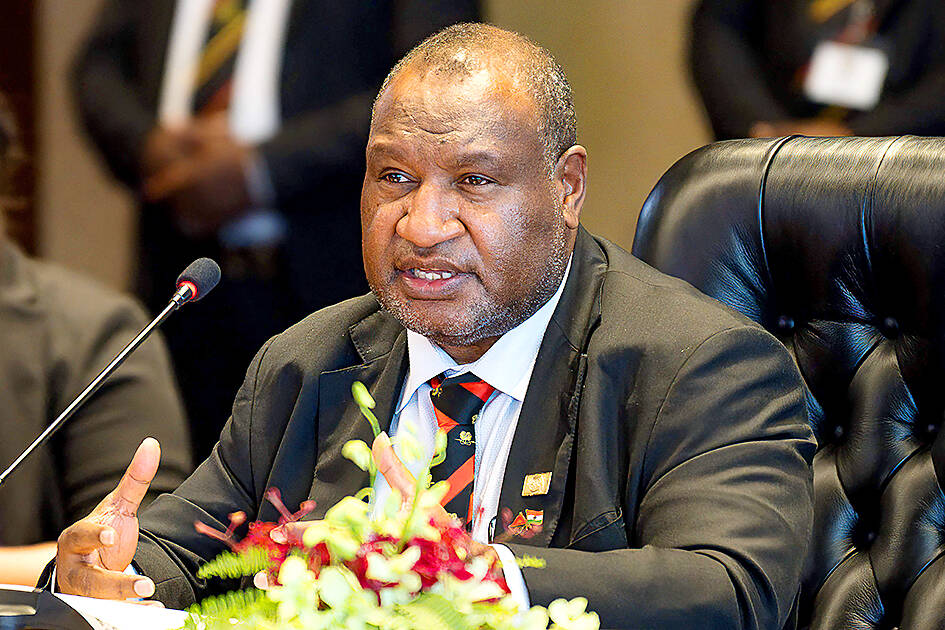Papua New Guinea (PNG) will not be used as a base for “war to be launched,” and a defense agreement with the US prohibits “offensive military operations,” its prime minister said yesterday.
US Secretary of State Antony Blinken on Monday said that a defense cooperation deal signed with Papua New Guinea earlier that day would expand the Pacific island nation’s capabilities and make it easier for the US military to train with its forces.
The deal sparked student protests amid concern it could embroil the country in strategic competition between the US and China.

Photo: AFP / Government of Papua New Guinea
Papua New Guinean Prime Minister James Marape said the agreement was not a treaty and did not need to be ratified by parliament, adding that he would release it in full for public scrutiny tomorrow.
“It’s not a military base to be set up here for war to be launched,” he told radio station 100FM.
“There’s a specific clause that says that this partnership is not a partnership for PNG to be used as a place for launching offensive military operations from Papua New Guinea,” he said.
The US and its allies are seeking to deter Pacific island nations from building security ties with China, a rising concern amid tension over Taiwan, and after Beijing signed a security pact with the Solomon Islands last year.
China has been a major infrastructure investor in Papua New Guinea, which sits near important sea lanes and international submarine cables linking the US and ally Australia, that were crucial in World War II.
Marape said that the PNG military is the weakest in the region amid high tensions.
The boost provided by the US would also improve domestic security and encourage more foreign investors to set up in the country of 9 million that is rich in natural resources but largely undeveloped.
“There will be substantial infrastructure investment” flowing from the deal, in airports, ports, roads, communications and electricity to benefit the public, he said, while not giving details.
Subsidiary agreements that would determine how the US military and civilian contractors come into the country are being worked out, he said.
Australia has welcomed the defense cooperation agreement between its closest neighbor and the US.

Kehinde Sanni spends his days smoothing out dents and repainting scratched bumpers in a modest autobody shop in Lagos. He has never left Nigeria, yet he speaks glowingly of Burkina Faso military leader Ibrahim Traore. “Nigeria needs someone like Ibrahim Traore of Burkina Faso. He is doing well for his country,” Sanni said. His admiration is shaped by a steady stream of viral videos, memes and social media posts — many misleading or outright false — portraying Traore as a fearless reformer who defied Western powers and reclaimed his country’s dignity. The Burkinabe strongman swept into power following a coup in September 2022

‘FRAGMENTING’: British politics have for a long time been dominated by the Labor Party and the Tories, but polls suggest that Reform now poses a significant challenge Hard-right upstarts Reform UK snatched a parliamentary seat from British Prime Minister Keir Starmer’s Labor Party yesterday in local elections that dealt a blow to the UK’s two establishment parties. Reform, led by anti-immigrant firebrand Nigel Farage, won the by-election in Runcorn and Helsby in northwest England by just six votes, as it picked up gains in other localities, including one mayoralty. The group’s strong showing continues momentum it built up at last year’s general election and appears to confirm a trend that the UK is entering an era of multi-party politics. “For the movement, for the party it’s a very, very big

ENTERTAINMENT: Rio officials have a history of organizing massive concerts on Copacabana Beach, with Madonna’s show drawing about 1.6 million fans last year Lady Gaga on Saturday night gave a free concert in front of 2 million fans who poured onto Copacabana Beach in Rio de Janeiro for the biggest show of her career. “Tonight, we’re making history... Thank you for making history with me,” Lady Gaga told a screaming crowd. The Mother Monster, as she is known, started the show at about 10:10pm local time with her 2011 song Bloody Mary. Cries of joy rose from the tightly packed fans who sang and danced shoulder-to-shoulder on the vast stretch of sand. Concert organizers said 2.1 million people attended the show. Lady Gaga

SUPPORT: The Australian prime minister promised to back Kyiv against Russia’s invasion, saying: ‘That’s my government’s position. It was yesterday. It still is’ Left-leaning Australian Prime Minister Anthony Albanese yesterday basked in his landslide election win, promising a “disciplined, orderly” government to confront cost-of-living pain and tariff turmoil. People clapped as the 62-year-old and his fiancee, Jodie Haydon, who visited his old inner Sydney haunt, Cafe Italia, surrounded by a crowd of jostling photographers and journalists. Albanese’s Labor Party is on course to win at least 83 seats in the 150-member parliament, partial results showed. Opposition leader Peter Dutton’s conservative Liberal-National coalition had just 38 seats, and other parties 12. Another 17 seats were still in doubt. “We will be a disciplined, orderly